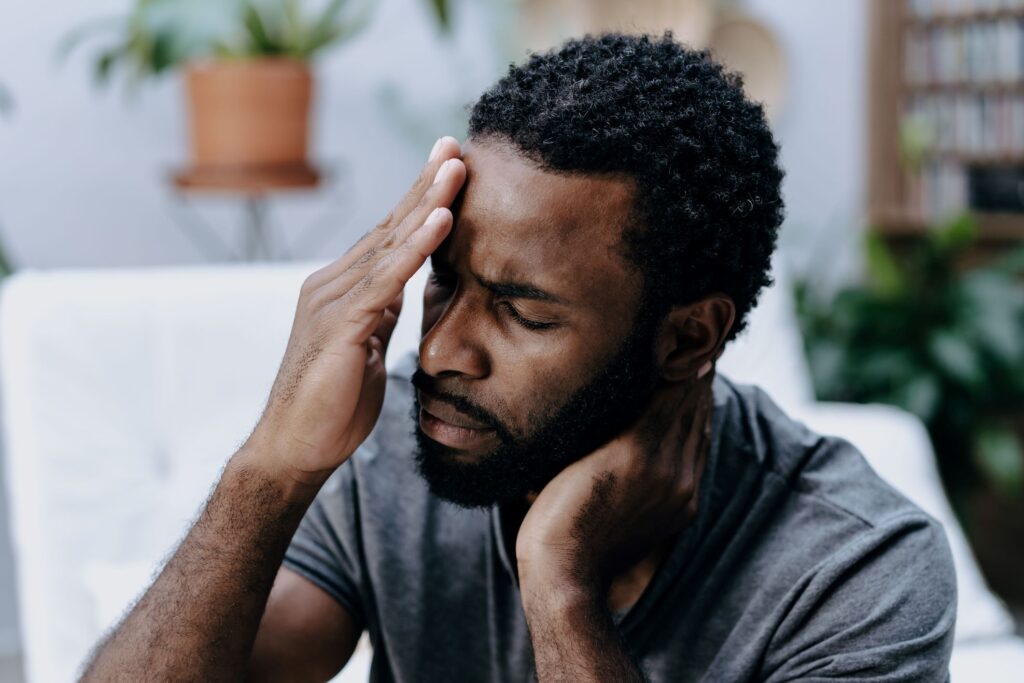When head and neck pain collide, your body is warning you that something needs attention. The combination of a severe headache with neck pain has a wide range of possible causes. But whether the reason is a hangover or brain swelling, you shouldn’t take headaches with neck pain lightly. Start by treating your symptoms at home, and if they don’t improve, seek a medical evaluation and treatment.

Why Do Head and Neck Pain Often Go Hand-in-Hand?
Headaches with neck pain often occur together because of the close proximity of sensory nerve fibers in the head and neck regions. In many cases, irritation or trauma in one area can lead to pain in the other. For instance, migraines frequently lead to throbbing headaches and neck stiffness.
What else might be behind your symptoms? Here are a few examples:
- Muscle tension and fatigue: Stress and lack of sleep are common triggers for temporary headaches and neck pain stemming from tense muscles and tiredness.
- Muscle strain: Poor posture or repetitive motions can strain your neck muscles, leading to headaches and neck pain.
- Traumatic injuries: A car accident, slip and fall, or other trauma can result in injuries affecting the head and neck regions.
- Alcohol intake: Consuming excess alcohol can induce headaches and neck pain.
- Medical conditions: Infections, meningitis, brain hemorrhages, and spine cancer are examples of serious medical conditions that can contribute to headaches and neck pain.
How to Treat Throbbing Headaches and Neck Stiffness
The most effective treatments depend on the underlying cause of your discomfort. If you’re able to pinpoint the reason your head and neck hurts, you can take steps to counteract the pain. Here are some suggestions:
- For tension headaches: Take over-the-counter medication, try deep breathing exercises, and rest. Adequate hydration, regular exercise, and mindfulness practices can also be beneficial in treating and preventing tension headaches.
- For cervicogenic headaches: Treatments often focus on alleviating neck issues since cervicogenic headaches originate there. Options include nerve blocks, pain medication, or physical therapy.
- For migraines: The goal is to relieve symptoms and prevent future migraines by taking pain relievers, triptans, or ergotamine drugs. Lifestyle changes are also essential. Try relaxation techniques and avoid your known triggers to keep migraines at bay.
When to Seek Medical Help
While most headaches and neck pain issues can be managed at home, don’t ignore persistent symptoms. Consult a doctor if the headache doesn’t go away, over-the-counter medications prove ineffective, or you experience additional symptoms like nausea or dizziness.
Headache and Neck Pain Relief at Greater Maryland Pain Management
Do throbbing headaches and a stiff neck interfere with your daily activities? Greater Maryland Pain Management is here to help. We offer a customized approach to pain management with a range of interventional procedures and medications. Our compassionate, knowledgeable doctors provide physician-guided solutions to ensure you receive the best possible care. Contact us at 410-672-2255 or visit one of our six Greater Maryland locations for the tailored treatment you deserve. To see a doctor as soon as possible, be sure to request a same-day appointment.